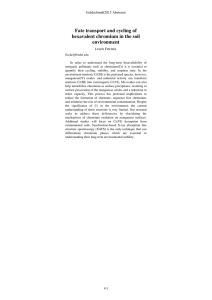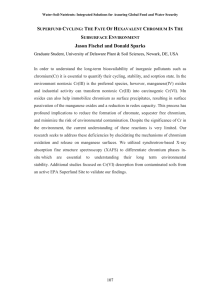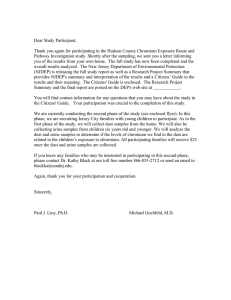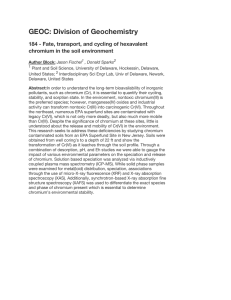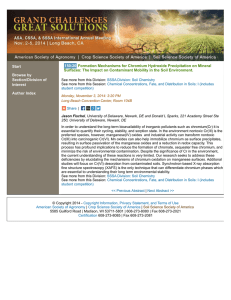CHROMIUM EXPOSURE AND HEALTH EFFECTS IN HUDSON COUNTY
advertisement
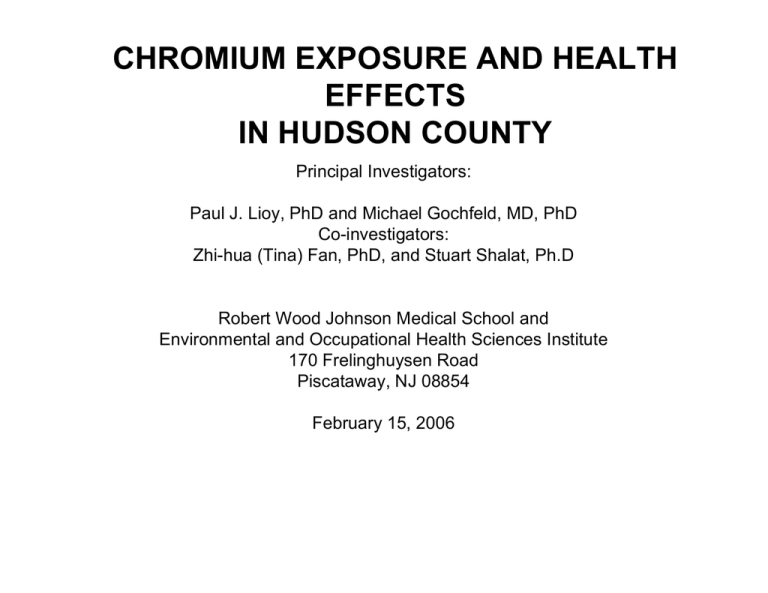
CHROMIUM EXPOSURE AND HEALTH EFFECTS IN HUDSON COUNTY Principal Investigators: Paul J. Lioy, PhD and Michael Gochfeld, MD, PhD Co-investigators: Zhi-hua (Tina) Fan, PhD, and Stuart Shalat, Ph.D Robert Wood Johnson Medical School and Environmental and Occupational Health Sciences Institute 170 Frelinghuysen Road Piscataway, NJ 08854 February 15, 2006 Background Hudson County industries played a major role in chromium extraction from ore • Depleted ore, still containing some residual chromium, was used as earth fill at nearly 200 sites in northern New Jersey. • Potential for soil, water and air transport of chromium to human receptors prompted extensive remediation. Public Health Concern • Public health and exposure concerns persist • Not all sites have been remediated • The effectiveness of remediation needs to be checked. • The possibility of current human exposure needs to be checked. • This study is designed to determine whether known-remediated waste sites are continuing sources of single and multiple route exposure to the surrounding community. Different forms of chromium • Trivalent chromium (Cr-III) is an essential trace element. • The body requires it for sugar metabolism • Hexavalent chromium (Cr-VI) causes lung cancer. • Both Cr-III and Cr-VI can be present in the soil. Therefore we need to know how much of each is present. • Laboratory analyses for separating Cr-III and CrVI are much better now. CHROMIUM EXPOSURE AND HEALTH EFFECTS IN HUDSON COUNTY: A two phase study • The study will be implemented with a series research activities and evaluation milestones. • Phase I: The exposure pathway study being Conducted by EOHSI – Implement the exposure route and pathway investigation. – Review of the current situations at specific sites and complete site visits in Hudson County. – Obtain input from the community on exposure situations of concern. – Evaluate Phase I study measurement results. – Determine if there are actual exposures that are occurring that have the potential to affect human health. Phase I: Pathways of Exposure • Goal: Identify potential human exposure pathways. • In order for chromium to cause harm it must move from the environment to humans. – This could occur through airborne dust that is breathed in. – It could occur through drinking contaminated water. – It could occur through direct contact with soil. • Are there “completed exposure pathways” now? • The results and conclusions will be examined and then explained to the DEP and the community. • Outcomes of Phase I – If the results demonstrate the existence of complete exposure pathways to Chromium+6 Phase II health evaluation will be designed by DEP and the DHSS – Phase II will be contingent on the demonstration of complete human exposure pathways in Phase I that can yield a public health hazard. Phase II: Health Effects • If the results of Phase I demonstrate the existence of complete exposure pathways to Cr-VI, the Phase II health evaluation will be recommended to the DEP • Phase II will be recommended to the DEP if there is evidence of complete human exposure pathways in Phase I that can yield a public health hazard. Phase I - Exposure • Specific Aim 1: The toxicity of the chromium contamination in Hudson County is due almost entirely to Cr-VI, a known carcinogen. • Therefore: – We will measure total chromium AND Cr+6, to clearly, distinguish exposures with a potential for health risk from exposures posing little or no risk. – Note: since our studies in the 1990’s were completed, reliable methods are now available for the specific analysis of Cr+6 in microenvironmental samples. Phase I: Exposure • Specific Aim 2: Environmental and “Microenvironmental” and Sampling for Cr+6 • “Microenvironment” refers to what people actually encounter in their homes – Surface dust • Rationale: our previous studies in Hudson County found that indoor and outdoor settled dust samples were associated with urinary chromium levels. • Exposure to high chromium in dust led to high chromium in urine. • This helped define the impact of individual chromium sites on homes in the residential areas selected for our study. – Tap water • A sample will be taken in each residence Phase I: Exposure – Near-surface air samples: Issue #1 • Rationale: typical ambient air concentrations of chromium near a known waste site are usually very low: A result of how particles are released and transported from a site. • Releases from open areas, e.g. waste sites, do not have regular or routine emissions characteristics, and are usually called fugitive emission sources. • Physical disturbance at a site and wind conditions can produce episodic exposures. – Near surface air sampling: Issue #2 • Air sampler placed near the surface • breathing zone height for a child, e.g. 1 meter above the surface can be used -to define the levels of emissions that can yield off-site transfer of chromium and human exposure • air sampling will be:PM10 and PM10-2.5. • Particles between 0 and 10 μm in diameter (a μ m is a millionth of a meter in size) and 10 μ m’s is 1/10TH the thickness of a piece of paper • Particles this size range are resuspendable into the air, and get into the lungs • These particles contain chromium mass of concern for offsite inhalation exposures. • These particles can be tracked into houses on shoes (“foot tracking” transport). Methods for Phase I • Multiple locations will be evaluated for the presence of active exposure pathways. • Triplicate (3) surface dust samples will be obtained for each outdoor sampling point with multiple sampling points used at a site and the surrounding area. • The spatial distribution of chromium species in and around a site will be used to identify any existing exposure pathways. • The study will focus on locations identified by the NJDEP’s Site Remediation Program (SRP) as capped, residential sites or other sites identified as being of concern for immediate or near term exposure. Methods for Phase I • The micro environmental surface dust wipe samples and surface soil samples will be analyzed for Cr+6 and total Cr for locations on and near sites. • Outdoor near-surface air samples will be collected at a convenient locations on or near the sites, and the surfaces selected will have the potential of being disturbed by wind or other mechanical forces . • • Residential buildings near Cr sites will be used to collect indoor dust samples from volunteers. Such locations would need to have permission from the owners or occupants prior to sampling. Indoor dust sampling will include basement walls and subterranean crawl spaces in surrounding residential buildings where visual evidence is found of transport of Cr+6 into buildings from a chromium site. Site Review in Phase I: Exposure • Specific Aim 3: identify a subset of the chromium sites for detailed inspection and evaluation including: – 1) capped sites for the efficacy of the remediation – 2) excavated sites or “closed” residential sites – 3) unremediated sites with either residential or occupational receptors – 4) other sites that may be identified during the study, Specific Aim #3 - Activities • • • • The sixteen capped sites will be examined in this portion of the study. – Rationale: concerns about the general appropriateness of capping as a remedy, including the design and integrity of the caps, the frequency and consistency of monitoring, maintenance, and oversight, and the adequacy of the caps to prevent offsite migration. We will engage an environmental engineer to perform the following: – Visual inspection of all caps – Identification of potential for offsite surface contamination. – Review of cap specifications, design, and construction. – Review of the required inspection procedures and reports. – Review of any actions previously taken, to provide assurance of cap integrity and adequacy.. The activity will include review of selected No Further Action (NFA) sites. These have remedies other than Caps The selected sites will be primarily associated with the Phase I exposure study Our Approach to Implementing the study • We are cognizant of the importance of transparency and community involvement in conducting the Phase I investigation • We have had extensive experience working with communities in New Jersey and elsewhere around issues of environmental contamination and risk, and using their counsel to assist in refining our initial approach. • We realize the issue of chromium in Hudson County requires an iterative approach with the community, both before the implementation of sampling, and in the presentation of results. • We will make every effort get input from the community to make our study comprehensive. • We will communicate validated analytical results to all stakeholders. General concept for the Phase 2 Design • With evidence of a complete route of exposure (i.e., significant levels of Cr+6 in the environment with clear potential for direct exposure and/or transport into dwellings) EOHSI will inform and recommend to DEP that a PHASE II health evaluation should be designed. • Biomonitoring is one tool that could possibly be used as an indicator of recent exposure. Our previous study correlated urine chromium with household dust exposure, particularly in children. This would be considered in our evaluation of the concepts needed to design Phase II.
